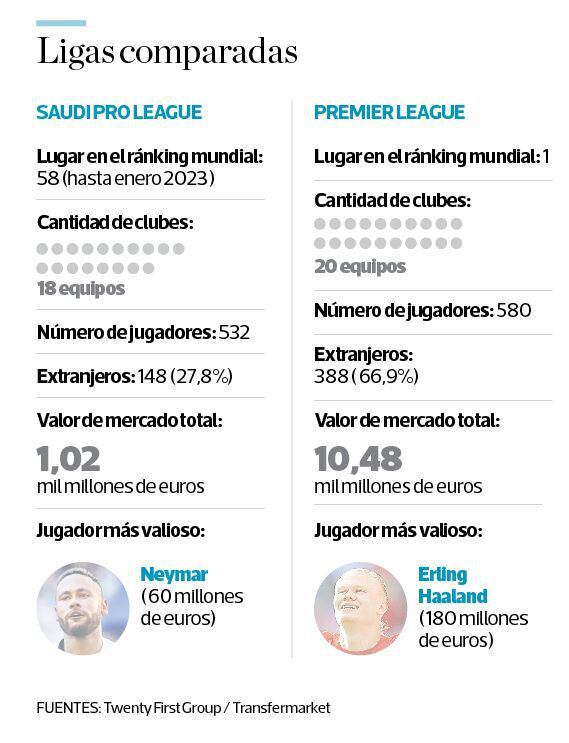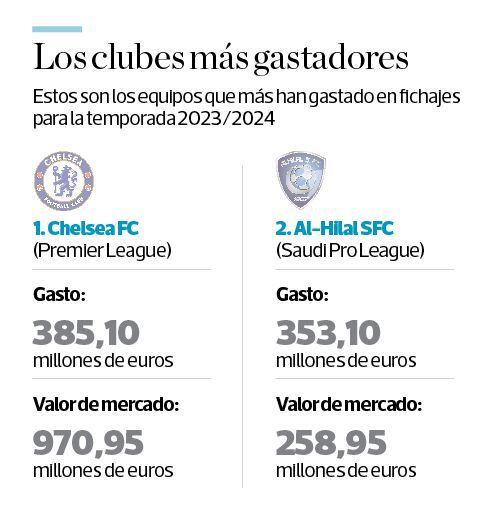Wallet rules. That seems to be the watchword of the saudis with the recent rain of signings of footballers that they have achieved in a few weeks, which caused figures who were usual in the competitive European leagues to decide to take a plane to go to a lower level championship, where glory will not abound, but the dollars and luxuries.
READ ALSO: A photo for history and the risk of going to prison: why is the trial in Georgia different from the rest that Trump has faced?
At 38 years old, Cristiano Ronaldo he was the first megastar to settle in the desert. His decision was not that surprising. At the end of their careers, many soccer players have opted for the minor leagues. But what the Portuguese did was not just that. His media signing opened the doors for others, who could still continue playing in Europe, to decide to emigrate.
Only between July and August was the transfer of Karim Benzema, N’Golo Kante, otavio, Sadio Mané, Roberto Firmino, Koulibaly and dozens of other soccer players worth millions of dollars. And the cherry on the cake arrived in Riyadh a few days ago: the Brazilian neymarfor which the Al-Hilal club has paid 90 million euros to Paris Saint Germain, in addition to offering them a juicy contract, a mansion, luxury cars and a series of high-level whims.
Thanks to your petrodollars, Saudi Arabia has decided to bet on exponentially raising the level of its league to make it competitive. But is it only that? What is behind this strategy? Sport, business or politics?
To try to scrutinize behind the millionaire investment that the Saudis are making in soccer – almost 900 million dollars, only in recent months – it must be framed within Vision 2030, a plan devised by the crown prince, Mohammed bin Salman, who for years has been trying to show himself as a reformer who seeks to modernize a country ruled by one of the most conservative Muslim monarchies in the world.
The task, especially in the eyes of the West, is not easy. Even more so when in the Saudi kingdom women do not have full rights, homosexuality is condemned and freedom of expression is conditioned. Without forgetting the indignation brought about in 2018 by the murder and dismemberment of journalist Jamal Khashoggi, from “The Washington Post”, allegedly ordered by Bin Salman himself.
This Vision 2030 aspires to diversify the Saudi economy so that it does not depend only on oil, whose world consumption would reach its maximum in 2040, according to what the Organization of Petroleum Exporting Countries (OPEC) has pointed out. Saudi Arabia is the world’s leading exporter of black gold, and the clock is already ticking down.
This diversification – which has been successfully implemented for decades by its Arab neighbors in Dubai, Abu Dhabi and Qatar – aims to increase tourism, become a commercial hub and attract investors. Unlike the Emirates, Saudi Arabia It has an immense territory where 32 million people live and two thirds of the population is under 30 years of age, which implies great potential, but also an immense challenge.

‘Soft power’ and ‘sportwashing’
For Mohamed-Badine El Yattioui, professor of International Relations at the American University in the United Arab Emirates, the Saudis are looking for two things with their million-dollar investment in soccer: “First, they want to develop a strategy to become a key player in soccer in the XXI century. Second, it is a ‘soft power’ strategy (or soft power) to show an image of modernization and of a more open country thanks to soccer”.
And adds: “There is also a fundamental element, and that is that they realized that the future of the football public is in Asia”.
The 2022 World Cup in Qatar showed the world that an Arab country could organize a sporting event and be successful, and that the controversies -such as the way in which they got the headquarters or the subhuman conditions for the construction of the stadiums- resonate in their moment, but when the games start, the scandals take place.
And soccer, the world’s most popular sport, is a great way to turn heads.
“It’s about ‘sportwashing’, a term that consists of cleaning your regime thanks to sport. Saudi Arabia He saw how, with Qatar 2022, both FIFA and UEFA abandoned any claim on the rights of women, or LGBT minorities. All the controversies were there, because money passed over values ”the historian Jorge Illa, PHD in Sports and Politics and a professor at the UPC, tells El Comercio.

He ‘sportwashing’ it is not something new. Even the Nazis did it with the 1936 Olympic Games, since the interests of politics and sports fans have always been intermingled. In this case, the Saudis have several stones in their backpack regarding human rights, persecution of opponents or abuses in the war in Yemen.
According to an investigation by the British newspaper “The Guardian”, the Saudi kingdom has spent 6.3 trillion dollars in sports agreements since 2021, an amount four times greater than what was invested six years earlier, and they plan to continue using the wallet.
“It is known that they have a willingness to invest around 50 billion dollars in sports in general, and 20 billion dollars in football alone. This is something totally new”expresses El Yattioui to this newspaper.
The Saudis have decided to go all-in on soccer after realizing that money could change the rules in another sport: golf. The emblematic PGA, the American golf league, had to merge with LIV Golf (the Saudi league) after the latter offered a lot of money to dozens of figures in this discipline, who ended up breaking away from the PGA to go play with the Arabs.
“Actually, they have been doing this for years, only this time they have put in a lot of money and what they have done is change their tactics. Instead of spending buying clubs -like English Newcastle- they have decided to invest and take the players to their country. What happened with golf served as a reference to repeat the play in football, and thus have a better league and reach better agreements with UEFA “refers Illa.
The examples of China and the US
This revolution in football caused by the saudis It has made us remember what happened at the time with China and the United States, two superpowers that also wanted to bet on football.
Since 2016, the Chinese league began to make millionaire contracts with the aim of raising the level, but the excitement did not last long. In the case of the MLS, ‘soccer’ has not yet fully penetrated American fans, but their league is no longer marginal and is increasingly competitive. Recently, the spectacular signing of Lionel Messi once again sparked interest.
But there is a big difference with what has been done by Saudi Arabia, where the money for the transfers comes from nothing less than the State itself. That is to say, soccer has been nationalized, something that not even the Chinese dared to do.
The Saudi Arabia Public Investment Fund (the PIF, which is a sovereign wealth fund belonging to the state) has taken control of the four biggest clubs in the Saudi Pro League: Al-Hilal, Al-Nassr, Al Ahli and Al Ittihad. . Thanks to this, they have made the millionaire signings this season, considered nothing less than public policy. That is to say, the money of the Saudi citizens is used to pay the salary of Neymar and the others.
“China tried, but they were just players, there was no strategic vision. In Saudi Arabia, the PIF, which is like an armed wing of the Saudi state, is behind this vision. It is not just about businessmen,” explains El Yattioui.
“It’s not just about players in the twilight of their careers anymore. They recently hired Gabri Veiga, 21, who was the star of Celta de Vigo. The money that the Saudis have cannot be compared. The question is how long they will hold this rate of hiring and that still cannot be known”, says Illa.
One of the most cherished objectives of the crown prince is to emulate Qatar in the organization of the World Cup, whether in 2030 or 2034, not only for the impact before the world but also to strengthen itself as a power in the Middle East and in its own country.
“There is a will of the crown prince to strengthen and improve his image before the West after what happened with Khashoggi, but also internally when it is his turn to be king and empower himself in front of his cousins, since not everyone accepted him as heir from the beginning” says El Yattioui.
“Through football, they seek to serve as a bridge between the Asian world, the Arab world and the Muslim world with the Western and European world,” he concludes.
Mohamed bin Salman’s vision is, above all, to keep his population happy to reaffirm the presence of the monarchy, but also to clean up his image in front of the world by changing the patterns that have always governed football, where Europe was the most precious objective. of the elite players. Now, the road is towards Mecca, the real one.
Source: Elcomercio
I am Jack Morton and I work in 24 News Recorder. I mostly cover world news and I have also authored 24 news recorder. I find this work highly interesting and it allows me to keep up with current events happening around the world.

:quality(75)/cloudfront-us-east-1.images.arcpublishing.com/elcomercio/YSZDFVNG55H3NCDBSLBLL7DZJY.jpg)

:quality(75)/cloudfront-us-east-1.images.arcpublishing.com/elcomercio/UTYAKT4WI5C4ZF4MMRKJNKO4BI.jpg)
:quality(75)/cloudfront-us-east-1.images.arcpublishing.com/elcomercio/K7GN2AQ5TVCNVBR7DKIYOYU6NY.jpg)
:quality(75)/cloudfront-us-east-1.images.arcpublishing.com/elcomercio/53A37WJ63FG5TBOFJGWAQ6ZZLM.jpg)
:quality(75)/cloudfront-us-east-1.images.arcpublishing.com/elcomercio/VXXRQYQD5VE3FE6BUSSPRBNZT4.jpg)
